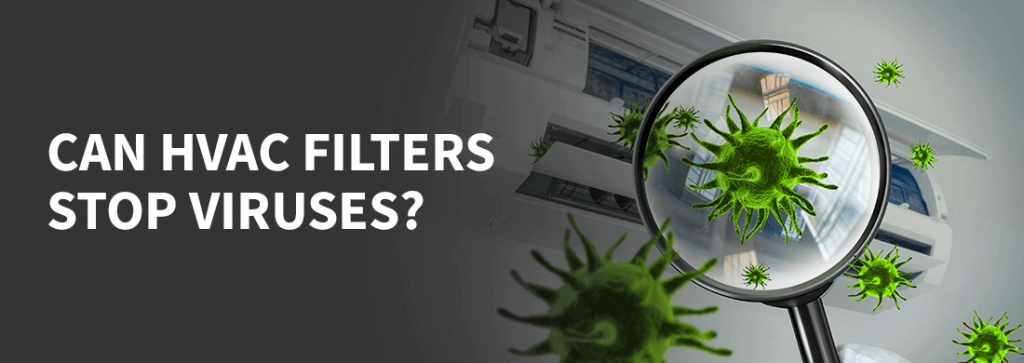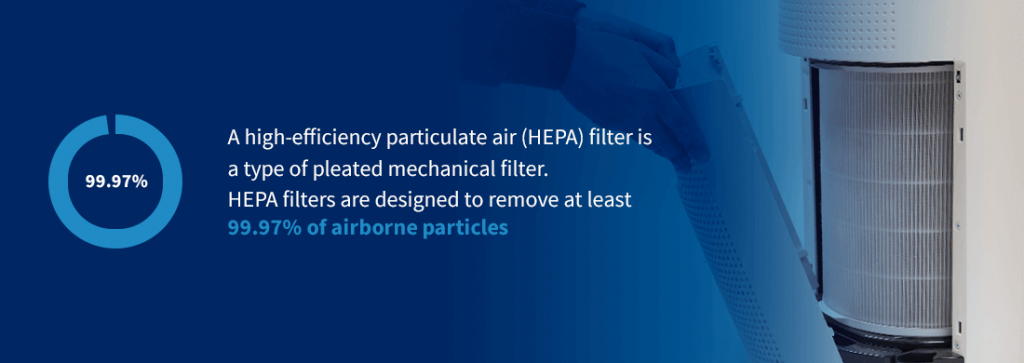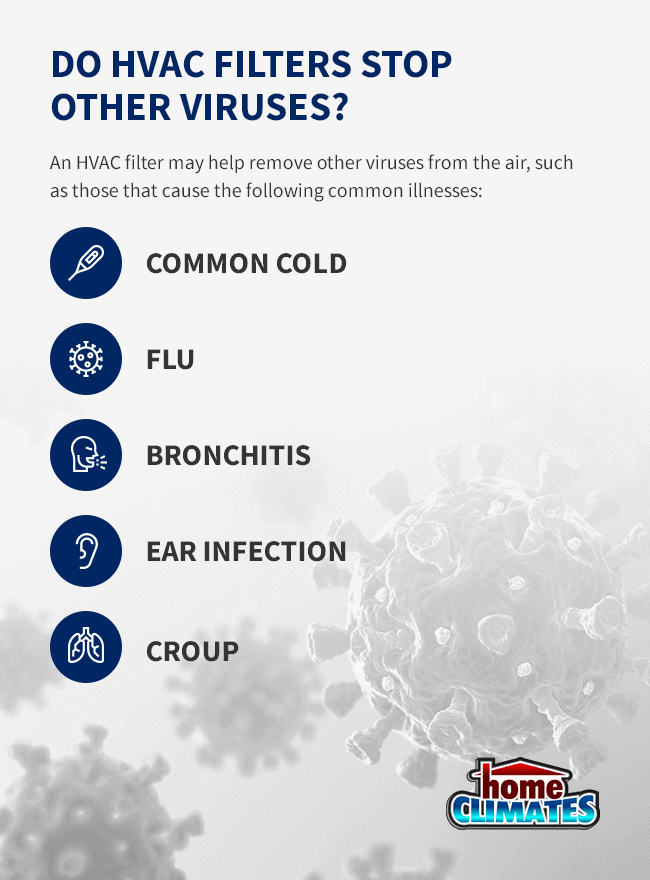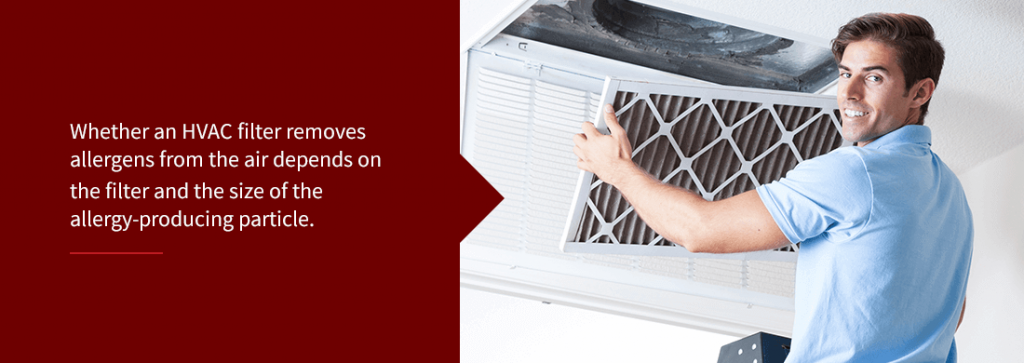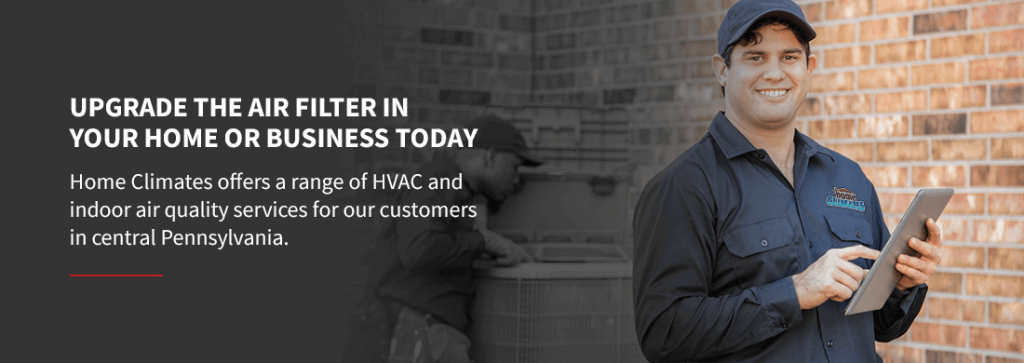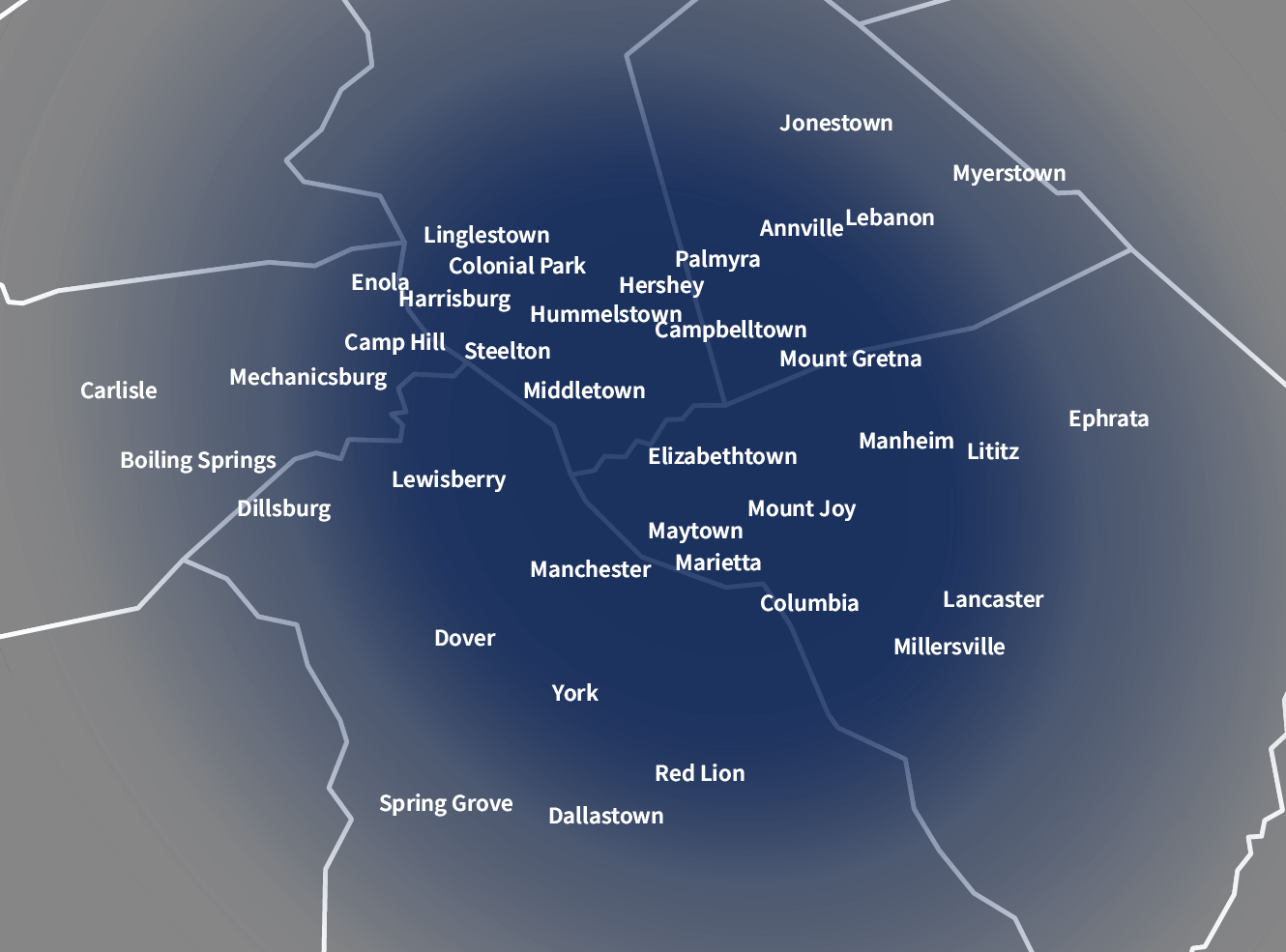While most air filters can’t kill viruses, you have options for trapping tiny particles and preventing them from circulating in the air. There are some air filters that kill viruses but these aren’t like regular HVAC filters. In this post, we’ll explore how air filters work, which ones can kill viruses and how they can improve the indoor air quality of your home or business.
With the majority of Americans spending 90% of their time indoors, mainly inside their homes, it’s understandable if homeowners feel a little nervous about indoor air contaminants. According to the Environmental Protection Agency (EPA), indoor air pollution is considered one of the top five environmental health risks.
Fortunately, you’re not alone in your battle against indoor air pollution. Your home’s heating, ventilation and air conditioning (HVAC) system should remove at least some harmful particles floating around the air. The question is — do air filters kill viruses and other small particles?
How Do HVAC Filters Work?
Your HVAC system is there to keep the temperature in your home comfortable, and its filter is part of the process. The cycle starts with the air return vent, which is the vent you can see on the wall. A fan, located in your outdoor unit, sucks air in through the air return vent. This air is drawn through a filter before it’s passed through the ducts to be redistributed. The HVAC filter is typically located in the return air duct next to the air handling unit, or the large metal box that connects to the ductwork.
The HVAC filter for your home works to remove particles from the air, mainly to protect the HVAC equipment from dust, dirt and pet dander. HVAC air filters only work when the system is running, which, according to the EPA, is usually less than 25% of the time.
These in-duct air filters trap particles as they pass through your home’s duct system. Generally, HVAC filters are 1 to 4 inches thick and may be flat or pleated.
The Different Types of HVAC Filters
- Mechanical: Most people have disposable mechanical filters in their HVAC systems. These filters may be flat and made from fiberglass or pleated and made from polyester or paper. Fiberglass filters are generally designed to remove large particles such as dust and pollen from the air to protect the HVAC equipment. Pleated filters might remove some small particles.
- Electrostatic: Electrostatic filters are made from polyester. As air moves through the material, it gives it an electric charge. This static electricity attracts particles to the filter. Many electrostatic filters are set in a metal frame and do not need to be replaced as often as disposable mechanical filters. These filters can typically trap smaller particles than most mechanical filters.
- Electronic: Electronic filters use electrically charged wires, rather than a fibrous material, to attract and trap particles. Electronic filters have medium-level efficiency but require frequent cleaning.
- HEPA: A high-efficiency particulate air (HEPA) filter is a type of pleated mechanical filter. HEPA filters are not typically installed in an HVAC system unless a home was built to be high-performing or a professional makes modifications during installation. HEPA filters are designed to remove at least 99.97% of airborne particles.
What Do HVAC Filters Do?
Generally, high-quality filters remove smaller particles from the air than basic filters, and they work more efficiently. One way to determine how well a filter cleans the air is to look at its minimum efficiency reporting value (MERV). The MERV rating system stems from a test procedure created by the American Society of Heating, Refrigerating and Air-Conditioning Engineers. Higher MERV ratings indicate better air filtration. Here’s an overview of the MERV ratings:
- Rating 1 to 4: These filters can remove a percentage of particles sized between 3 and 10 microns. To put this in perspective, 1,000 microns equal 1 millimeter. A filter with this rating is considered low-efficiency and is not designed to function as an air purifier. Instead, its primary purpose is to protect the HVAC system. Flat air filters with a MERV rating of 1 to 4 are commonly used in home furnaces and air conditioners.
- Rating 5 to 13: Some of the filters in this category can remove particles as small as 1 micron from the air. These filters are considered to have medium efficiency and can trap many different kinds of particles, including bacteria. Most pleated air filters fall into this category.
- Rating 14 to 16: These filters can remove particles from the air that are as small as 0.3 microns. These are considered high-efficiency air filters.
What do air filters filter out? Depending on a filter’s MERV rating, it might remove the following types of particulate matter from the air:
- Dust
- Pollen
- Pet dander
- Mold particles
- Bacteria
- Viruses
If you decide to upgrade, the EPA recommends choosing a filter with at least a 13 MERV rating, or the highest-rated filter your HVAC system can handle. No matter what type of filter you wish to install, you’ll want to ask an HVAC technician for advice to ensure you select a filter that’ll function properly in your home.
Can Your HVAC Filter Stop the Coronavirus?
A quality air filter may help reduce the number of coronavirus particles floating in the air. However, whether or not an HVAC air filter removes virus particles depends on several factors.
First, let’s consider how people spread viruses that cause diseases like COVID-19. When a person coughs, sneezes or talks, they send a range of particle sizes into the air. Some of them are small, and some of them are large. These particles might contain infectious organisms. Large particles, or those that range in size from 5 to 15 microns, stay in the air for several minutes before falling to the ground. Therefore, these large particles usually don’t travel far enough to reach the HVAC system.
Tiny particles, or those smaller than 5 microns, can stay in the air for hours. Theoretically, these particles could reach the HVAC system. The coronavirus itself is 0.125 micron, or slightly bigger than the influenza virus. However, the droplets the virus travels on are often larger and easier to capture with an efficient filter — if they reach the filter in the first place. All particles start to evaporate the moment they hit the air.
According to the World Health Organization (WHO), experts think the coronavirus is transmitted mainly through large respiratory droplets, meaning you’re more likely to become infected by the virus if you’re in close contact, or within 3 feet, of an ill person. However, as WHO states, airborne transmission of the coronavirus via smaller particles may be possible, and further studies are needed.
Although there’s a lot more to learn about COVID-19, researchers suggest an HVAC system can reduce the number of virus particles in the air and possibly even the ones that land on surfaces. You need to choose a filter with a high MERV rating, as low-efficiency filters are unlikely to make a difference. It may also help to combine your HVAC filter with an air purifier. Air purifiers are designed specifically to improve air quality by removing toxins from the air. They aren’t just about protecting your HVAC system.
If you want an HVAC filter for the coronavirus that works well, you need to make sure it’s properly installed and maintained.
Do HVAC Filters Stop Other Viruses?
An HVAC filter may help remove other viruses from the air, such as those that cause the following common illnesses:
- Common cold
- Flu
- Bronchitis
- Ear infection
- Croup
As mentioned, it depends on whether the tiny particles reach the filter in the first place and if the filter is designed to remove small particles from the air.
Keep in mind that all viruses are extremely small. According to the Microbiology Society, viruses are so small that 500 million rhinoviruses, which cause the common cold, can fit onto the head of a pin. Another example is influenza. Influenza virus particles range in size from 80 to 120 nanometers, or 0.08 to 0.12 microns. These particles may be too tiny for standard HVAC filters to catch, but HEPA filters could remove most of the virus particles from the air.
Consider a Reme Halo In-Duct Air Purifier
For the highest protection against viruses and other tiny particles in the air, you’ll want to consider adding an air purifier to your HVAC system. A whole-house air purifying solution, such as the Reme Halo, reduces air pollutants and actually kills viruses that float in the air or land on surfaces. By adding an air purifier to your home’s ductwork, you also ensure you clean the air in your entire house, and not just in one room.
The Reme Halo is an in-duct whole-home air purifier that can cleanse any section of your home as long as it’s reachable by your HVAC. It’s currently the best solution for whole-house air purification, and it can easily be integrated into most HVAC systems.
The Reme Halo has been tested against various viruses and bacteria, such as the H1N1 virus and E. coli, and has been found to kill up to 99% of viruses, bacteria and mold. It also removes gases and odors from the air to create a fresh, easy-to-breathe environment. Unlike a regular HVAC filter which requires polluted air to move through the filter to work, a Reme Halo produces a hydrogen peroxide plasma that moves through your home and purifies contaminants at the source. It also helps kill germs on surfaces.
In reference to COVID-19, the Reme Halo Air Purifier hasn’t been tested specifically on this virus but COVID-19 is a member of the enveloped RNA coronavirus family and there are validated test results showing the air purifier reducing 99+% of similar viruses.
If you’re considering upgrading your HVAC system, now might be the perfect time to think about a Reme Halo. A Reme Halo can also be an excellent solution for business owners who want to protect their customers from germs and keep them coming back. If you’re interested in installing a Reme Halo in your home or business, an HVAC professional can help you get started.
Learn More About The Reme Halo
Do HVAC Filters Remove Allergens and Pollen?
Here in Elizabethtown, Pennsylvania, we understand how bad allergies can get at certain times of the year, especially in August and September, when ragweed pollen brings many people to tears. Pollen, which may get into your house through an open window, or even by catching a ride on your hair, is only one type of allergen many of us have to worry about. Other indoor allergens include:
- Mold spores
- Dust mites
- Cockroaches
- Animal dander
These allergens can trigger asthma attacks or cause hay fever in some individuals. Nearly 8% of adults in the U.S. experience hay fever.
Whether an HVAC filter removes allergens from the air depends on the filter and the size of the allergy-producing particle. Allergens vary in size, but some of them are quite large. For example, pollen ranges in size from 15 to 200 microns.
According to the EPA, most mechanical air filters do a good job of catching large particles like dust, pollen and animal dander. But, since many of these particles settle quickly and can’t reach the air filter, you’ll have to take other measures to reduce the number of allergens in your home, such as frequently washing bedding and cleaning household surfaces.
Nevertheless, if household members suffer from allergies, it’s recommended to use an air purifier in addition to frequently cleaning the HVAC filter. If mold is causing issues in your home, you can expect an air filter to remove some of the mold particles in the air, but you’ll need to eliminate the source of the mold to solve the problem completely.
Do HVAC Filters Stop Bacteria?
Bacteria are bigger than viruses, but they’re still pretty small. In general, bacteria range in size from 0.3 to 5 microns. Most bacteria do not cause any harm, and less than 1% of the different kinds of bacteria can make people sick. However, those that can make you ill reproduce quickly once they get inside the body. This includes bacteria like streptococcus. Streptococcus bacteria cause strep throat, and they are highly contagious. These bacteria spread through the air when someone sneezes or coughs.
Like viruses, small bacteria might attach themselves to larger particles that can be trapped by an HVAC filter. A more efficient filter will capture a greater amount of particles at different sizes. Other factors, like airflow, will play a role in whether or not the bacteria reach the filter.
Upgrade the Air Filter in Your Home or Business Today
In today’s world, there’s a lot of uncertainty when it comes to viruses, bacteria and other toxins that might find their way into your home or business. It’s understandable if you’re looking for an HVAC filter to remove viruses, and we want to help. When you turn to Home Climates, you can be sure our professionals will do what it takes to provide clean indoor air for you and your family.
Home Climates offers a range of HVAC and indoor air quality services for our customers in central Pennsylvania. Our reliable, highly experienced team can determine and install a top-quality air filtration system in your home to meet your unique needs. We focus on whole-house solutions to ensure all the air you and your family breathe is as clean as possible. To request a repair or estimate and upgrade your air filter, contact us today!








